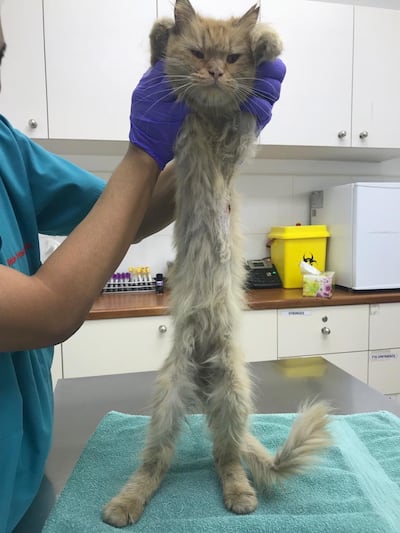Animal welfare volunteers have called for a clampdown on illegal breeders as they struggle to deal with a wave of abandoned pets.
Member charities of the government-backed Emirates Animal Welfare Society reported a spike in the number of cats and dogs dumped across Abu Dhabi and Dubai.
Experts blamed unlicensed breeders who are unable to sell their animals online.
As veterinary bills to treat rescued pets soar, charities urged authorities to act against unregulated breeding and illegal selling.
"The situation is getting worse and when people cannot sell the animals, they are dumping them," said Sarita Harding, a volunteer at Animal Action, one of the groups under the EAWS umbrella organisation.
“People do not understand the consequences and they [the pets] are being sold to homes that could be taking rescue animals, rather than these illegally bred pets.
“It is hard to keep up with the numbers we are seeing. This year has been our worst, with vet fees close to Dh160,000.”
Cases of unwanted designer dogs are the most common and involve breeds such as pomeranians, Maltese, chihuahuas, French bulldogs, labradors and huskies.
Anyone found selling pets online without a government licence can be fined Dh20,000 per animal.
Volunteers at Kittysnip, a pet adoption service in Dubai, said they too are struggling to cope with the numbers of stray cats in need of a home.
“The mindset of these breeders is that this is a quick way to make money,” said Carol Geldenhuys, a service volunteer.
“When they cannot sell these fluffy cats, or if they don’t want to breed any more, they dump them.

“Anything from two to 40 cats or more are being dumped in one go by these breeders.”
The dumped pets are not neutered or microchipped, making it impossible to track down the breeder. In July and August this year, Kittysnip volunteers rescued 42 cats from the streets that were in need of veterinary care.
Cats dumped on the streets often die from heat exhaustion or starvation.
“By the time we find them they are in a shocking condition and close to death or already dead,” said Ms Geldenhuys.
The EAWS is the only legally registered animal welfare organisation in the UAE.
It aims to support the recently updated federal laws on animal welfare and supports eight volunteer-led groups.
They are Animal Action, Animals and Us in Fujairah, Animal Welfare Al Ain, KittySnip in Dubai, Strays need interim or furever friends (SNIFF), Red Paw Foundation, Rescue Abu Dhabi and 38Smiles.
Lesley Taylor, a volunteer with Animal Welfare Al Ain, said social media is teeming with illegal sales of privately bred dogs and cats.
“We are concerned the unregulated breeding of cats and dogs is contributing hugely to the stray animal epidemic,” she said.
“Coupled with the lack of knowledge by many about the importance of neutering, it is putting a great deal of pressure on welfare organisations.”
“We would like the authorities to take a much stronger stance against unregulated breeding and illegal selling,” said Ms Taylor.
“Ultimately, the issue becomes a matter of public health as more and more sick animals are released into our communities when these animals become either too old or too ill to be sold.”
In 2018, the Ministry of Climate Change and Environment amended existing legislation and made pet abandonment a crime. The amendments also set out obligations for pet owners.
An act of animal cruelty could also now carry a fine or jail sentence.
In July, an online early warning system was introduced by the ministry to encourage the reporting of cases of animal cruelty.
The online biosecurity early notification system allows residents to report incidents related to welfare laws, including animal cruelty and illegal possession of dangerous animals.
“Managing the rising population of stray animals is a challenging task that requires concerted efforts,” said Mohammed Al Zaabi, director of environmental compliance at the ministry.
“We are collaborating with the public and private sectors to devise a unified framework for controlling stray and predatory animals.”
The ministry said that framework also helps to reduce the risk of disease traffic accidents involving stray animals.
Kaltham Kayaf, acting director of the ministry's animal health and development department, said pet owners who no longer wanted their pets must find appropriate new homes or surrender them to authorities.
“If an animal is offered for sale without obtaining the required licence from the concerned department, its owner faces a fine up to Dh20,000,” she said.
“However, if the animal intended for sale is sick or injured, the punishment is imprisonment for up to one year and a fine up to Dh200,000, or either of the two penalties."


